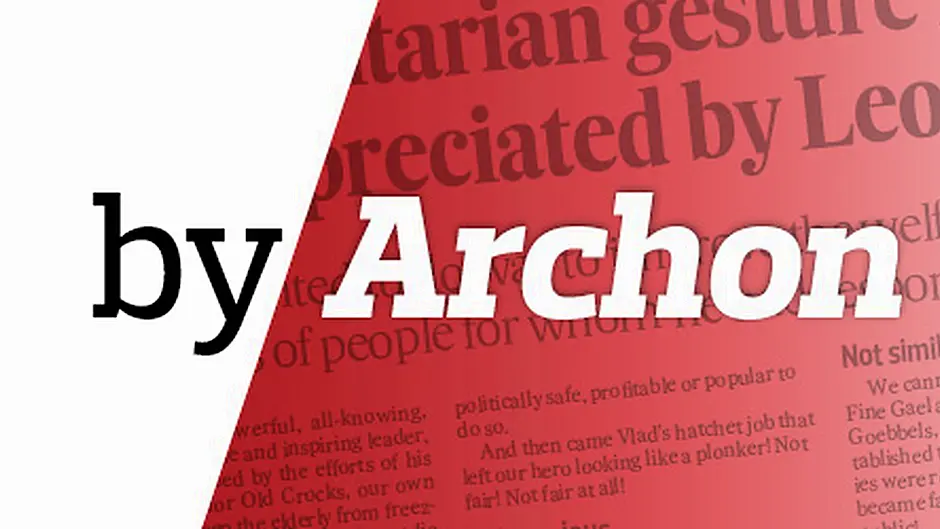A Johnson-inspired manic no-deal Brexit would be a disaster for Ireland given its potential to re-ignite bloody conflict in the North.
BORIS Johnson’s government is remarkable for this astonishing fact: it knows little about Irish history and is not overly-interested in the Six Counties’ political and economic difficulties.
Indeed, the fragile arrangement of the peace process and the uneasy accord underpinning it do not appear to be matters of any importance for the Johnson gang – an attitude that has been interpreted as British indifference to Irish susceptibilities.
Simon Coveney described Johnson’s statements on the Brexit negotiating process as ‘very unhelpful’ – a comment larded with the moderation that one would expect from a clued-in Foreign Affairs minister. But, behind the diplomatic lingo, the message was clear: a Johnson-inspired manic no-deal Brexit would be a disaster for Ireland.
Not only would it devastate the Six County economy, it had the potential to trigger a conflict not too dissimilar to the one that lasted four decades and claimed more than 3,500 lives.
An alarmed Sinn Féin said the priority had to be the protection of the Good Friday Agreement and the Northern Irish economy at all costs. Both the British and Irish governments had to ensure there was no return to a hard border on the island of Ireland.
Also rattling nationalist nerves is the lack of experience of the Northern situation by the Secretary of State, Julian Smith. So far Smith’s major political achievements consist of bringing the Tour de France Grand Départ to the UK and enduring a DUP political conference without boredom churning his brain to a pulpy mash.
Significantly, his only contribution to Irish historical commentary was this terse email: ‘Have been privileged to work with the DUP all week!’ Which sounded caustically ironic.
Tory extremism
Making matters worse is the Irish government’s dilemma of having to deal with political attitudes that look ominously similar to extremism. Michael Gove, for instance, in a pamphlet entitled ‘Northern Ireland: the Price of Peace,’ compared the Belfast Agreement to the appeasement of the Nazis in the 1930s! The Peace Agreement, he excitedly declared, was a ‘mortal stain’ and a ‘humiliation of our army, police and parliament.’
Professor Brendan O’Leary, a former advisor to the UK Labour Party and the Irish government in the run-up to the Good Friday Agreement, described Gove’s pamphlet as ‘disgracefully irresponsible.’ He said that Gove was deeply unsuitable to pontificate on British-Irish relations.
The professor also might have included in that category the Secretary of State for the Home Department, Priti Patel, who advocated using potential food shortages in Ireland as a means to force the Irish government to drop its backstop demands – a disgusting remark that evoked the horrors of the Famine.
And then there is Rees-Mogg (the chap with the top hat) who supports a return to border checks. ‘There would be our ability, as we had during the Troubles, to have people inspected. It’s not a border that everyone has to go through every day. For security reasons we kept a very close eye on the border to try and stop gun-running and things like that.’
Where’s the border?
Coveney, to his credit, sharply rebuked the top hat man: ‘It’s hard to believe that a senior politician is so ill-informed about Ireland and of the Irish border issue that he could make comments like these. We have left the Troubles behind and we intend keeping it that way.’
Indeed, Coveney appealed to Rees Mogg to learn something of recent Irish history and that ‘thousands of people had paid the ultimate price because of the absence of a successful peace process.’
Even Bertie Ahern popped up to describe Rees-Mogg as a ‘lovely fella when he’s asleep’ and that the Englishman hadn’t a bull’s notion where the Border was – a common failing among MPs who imagine it to be ‘somewhere around Dundalk or Newry, with a gate in it.’
Nor should we ignore Gavin Williamson, a former Defence Secretary until sacked (he’s now Education Secretary). Last March, he announced that he intended to make soldiers immune from prosecution for ‘alleged offences’ committed more than ten years ago. He said it on the same day that Northern Ireland’s Public Prosecutor was bringing charges against a former Bloody Sunday paratrooper.
Williamson mystifyingly said of the Paras: ‘We are indebted to those soldiers who served with courage and distinction to bring peace to Northern Ireland.’
And what about Environment Secretary, Theresa Villiers, who appears to inhabit a mythical land? Having had a stint as Northern Ireland Secretary, during which time she defended the very tarnished reputation of the RUC and British Army, she recently insisted that concerns over border controls in the event of Britain leaving the EU were nothing but ‘scaremongering.’
Big words?
But it is the Foreign Secretary, Dominic Raab, who is the most hostile to Irish interests. He wants the backstop plan to be ‘ditched’ immediately.
According to this guy, Brits should take a ‘strongman’ approach to the Border and to the EU and he couldn’t care less if Britain left without a deal on October 31st. Raab recently boasted he hadn’t read the Good Friday Agreement. It wasn’t the type of ‘cracking’ novel one takes on the summer hols, he quipped.
An extraordinary comment, considering that the Good Friday Agreement is just 35 pages long and a British schoolboy preparing for the 11-Plus could get through it. Perhaps the Foreign Secretary dislikes all international treaties and stuffs them behind the radiator?
Remote possibility
In the meantime, Johnson continues to parrot the line that the ‘backstop’ is ‘anti-democratic’ and he’s certain of getting a deal from Brussels that would be ‘a new and exciting partnership based on free trade and mutual support.’ He also throws in the suggestion that a ‘no deal’ also could be on the cards, although such a disaster was ‘a remote possibility.’
Which raises this question: Is Johnson off his political trolley? For instance in June 2018, leaked recordings had him asserting that the border issue had been blown out of proportion. He was of the opinion that since so few firms used the border regularly it was beyond belief that Tories were allowing their agenda to be dictated by ‘this folly.’
What is certain is that Johnson’s supercilious attitude to a matter of deadly importance for this country is not comical. It’s not Jeeves and Wooster. It is insulting, veering on racism, and it sticks in the craw.
The EU is prepared to accept a no-deal Brexit if it is orderly. But that’s not likely to happen. Within such a context, it is incumbent on Johnson to bear in mind the warning from
European Council President, Donald Tusk: ‘There would be a special place in hell for those who promoted Brexit, without even a sketch of a plan.’ Nothing is plainer than that!








